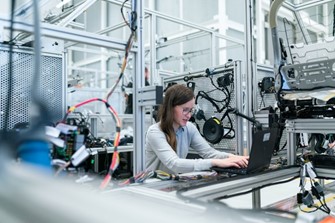In recent years, there has been a growing emphasis on the importance of diversity and inclusion in the fields of science, technology, engineering, and mathematics (STEM). Despite significant progress, women remain underrepresented in STEM professions, particularly in emerging fields such as green technology. Ryan Calkins, Port of Seattle explores the challenges facing women in STEM fields, the importance of closing the gender gap in green technology, and initiatives aimed at promoting inclusion in the workforce.
The Background
Historically, women have been underrepresented in STEM fields due to various societal, cultural, and institutional barriers. Stereotypes and biases about gender roles and abilities often discourage girls and women from pursuing careers in these fields from a young age. Additionally, lack of support networks and limited access to opportunities for advancement contribute to the gender gap in these professions.
According to the National Science Foundation, women make up only 18% of the workforce in science and engineering fields. The underrepresentation not only limits opportunities for individual women but also hinders innovation and economic growth. Closing the gender gap in this sector is essential for promoting diversity, driving innovation, and addressing global challenges such as climate change and environmental sustainability.
Here are some key reasons why women have often not taken jobs in the STEM sector:
- Gender Stereotypes: From a young age, girls are often exposed to gender stereotypes that suggest certain subjects and professions are more suitable for boys than girls. This societal conditioning can influence girls’ perceptions of their own abilities and interests, leading them to opt out of technology-related pursuits.
- Lack of Role Models: The underrepresentation of women in leadership positions and prominent roles in the industry can perpetuate the notion that women are less capable or suited for careers in these fields.
- Opportunities: Women may face systemic barriers and unequal opportunities in education, employment, and career advancement within the sector. Discrimination, bias, and workplace cultures that prioritize male employees can hinder women’s progress and limit their access to resources and opportunities for professional growth.
- Work-Life Balance: The demanding nature of these careers, with long hours, unpredictable schedules, and limited flexibility, can pose challenges for women who are balancing career aspirations with family responsibilities. Without adequate support systems and policies that promote work-life balance, women may feel discouraged from pursuing or remaining in such roles.

- Lack of Exposure and Access: Limited exposure to STEM education and extracurricular activities during childhood and adolescence can deter girls from developing an interest in these important subjects.
Despite these challenges, recent educational initiatives, such as promoting STEM education in schools, have played a crucial role in promoting exposure and addressing gender disparities in careers. These initiatives aim to spark girls’ interest in these subjects and cultivate a supportive learning environment that encourages girls to pursue these innovative pathways.
The Importance of Women in Green Technology
Green technology, also known as clean technology or environmental technology, encompasses a wide range of innovations aimed at reducing environmental impact, conserving natural resources, and promoting sustainable development. From renewable energy to waste management, green technology plays a crucial role in addressing environmental challenges and transitioning to a more sustainable future.
Women bring unique perspectives, talents, and insights to the industry. Their diverse experiences and backgrounds can lead to innovative solutions and approaches to many environmental issues. By closing the gender gap, we can harness the full potential of female talent and expertise to accelerate progress towards a more sustainable and resilient world.
Closing Thoughts
Closing the gender gap particularly in emerging fields like green technology, is essential for driving innovation, promoting sustainability, and addressing global challenges. By supporting women in pursuing careers in STEM, we can unlock new perspectives, talents, and solutions that benefit society as a whole. Through initiatives that provide mentorship, support networks, and advocacy, we can create a more inclusive and equitable workforce where all individuals have the opportunity to thrive and make a meaningful impact on the world.
